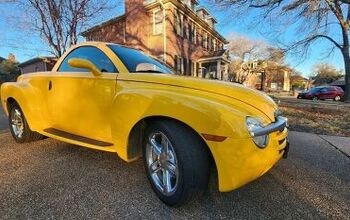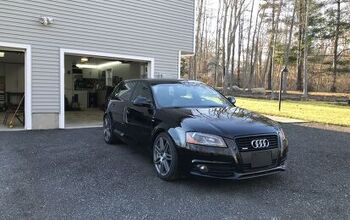Memoirs Of An Independent Repair Shop Owner: The End of the (Econo) Line – On Life Without the Venerable Van
The last five years certainly have not been kind to Institutions throughout the world, especially in these United States. Whether they be people, places, commodities, companies, lifestyles or leisure activities, nothing seems to be immune to the force that is presently driving things along.
The automobile, and the whole infrastructure supporting it is experiencing a paradigm shift that has wrought some serious casualty:
How about the construction of “tinker-proof” vehicles, complimenting the attitude of the mainstream car buying public that seems to have little interest in doing so. There is much more to be said about all of this, and indeed, I intend to do so in the foreseeable future.
Well, the future is now, and I can think of no better subject than the impending demise of the Ford Econoline nameplate—the 2013 model year being the swan song for the tried-and-true body-on-frame stalwart.
The reasons for this move seems to be twofold: ostensibly both a market and marketing-based decision. I can understand that the replacement unibody design is cheaper to produce, but what about those buyers who require more durability than such a design can offer? The part that’s really a puzzlement, though, is why kill the nameplate?
Considering that the economy here in the U.S.—and we’re talking that of the mainstream middle class—is in a world of hurt, it’s apparent that deporting oneself in an economical fashion is now considered to be a thing of virtue. Wouldn’t that place a product with an appropriately sympathetic name in a pretty solid position?
But corporations do move rather slowly, especially regarding such important changes. With the economic prosperity that existed before the onset of “hard reset”, dropping the “E” prefix from their efficient motorized boxes might have made more sense. At any rate, what they have done, they have done; and now we have decades of memories to reflect on. I’m going to bore you with a couple of mine, and I hope you can do the same for me, and all of the “Memoirs” readers.
I’ve climbed into countless examples of the E-van, for the purpose of performing maintenance, but inevitably, and really unavoidably, the experience proved to be insightful as to the owner’s personality—in ways that a typical passenger car will never be able to.
This is probably because people very rarely choose a van solely for transportation—even if it IS their sole means of motorized transport. Vans generally are work vehicles, to one degree or another; and the nature of the work my E-van customers did was always readily apparent by the interior appointments and general gear stash found within. Whether gardener, handyman, construction worker, telephone lineman, locksmith—or a litany of other professions (some even not considered blue-collar, like mountaineer, for instance)—it wasn’t hard to tell who did what.
Probably the most colorful professional use of an E-van I’ve personally experienced has got to be by that of one Mike Watt: electric bassist and bandleader known for his seminal work in the post-punk trio “The Minutemen”, and more recently, touring bassist with Iggy Pop’s reformed “Stooges”.
I initially got to know “Watt” through conversations before and after club gigs he was playing in and around the Los Angeles area, at the beginning of the Millennium. It wasn’t too long until he enlisted my services to prep his early-nineties extended-box E-250 for an upcoming “Hellride”: usually a whirlwind summer tour of the U.S. and Canada featuring much wheeling and many one or two-night stands on what could be loosely called the “Indie Club Circuit”. He’d cram his trio and accompanying gear on in, and off they’d go.
Watt was still “Jamming Econo”—a term coined and adopted by the Minutemen, back in the day, defined as living and operating on-the-cheap—for these tours; so the goal was for me to do just what was necessary to get him and his crew du jour there and back reliably and safely.
Not necessarily an easy thing to do when “The Boat”—an endearing term for the van, based on his background nautical—was nearing the 250K mark, and showing signs of structural fatigue. Nevertheless, we got through a couple more “Hellrides” before he retired that boat in favor of a later model E-unit.
No doubt, this change was a somewhat difficult one, as there was such a collection of tour memorabilia intrinsically tied to, and installed (in some cases, in a rather well-integrated fashion) all over the interior as to make it a sort of Rolling Indie Rock Shrine. The dashboard was a shrine in its own right, brimming with an eclectic, if not downright bizarre assortment of knick-knacks of all stripes—very few of them secured by anything, save for the usual and customary gravity and friction!
It made road tests interesting, to say the least; trying to balance the force required for me to be able to properly assess The Boat’s condition, without displacing all of that shrine-ness and permanently upsetting indie-rock’s Karmactic World in the process. Quite a responsibility!
You can actually see in-vehicle footage of Watt piloting that very same Boat (may it now rest in peace) around the streets of his hometown San Pedro, in the documentary “We Jam Econo—The Story of The Minutemen”. I highly recommend it.
As an ASE Certified L1 Master Tech, Phil ran a successful independent repair shop on the West Coast for close to 20 years, working over a decade before that at both dealer and independent repair shops. He is presently semi-retired from the business of auto repair, but still keeps his hand in things as a consultant and in his personal garage.
More by Phil Coconis
Latest Car Reviews
Read moreLatest Product Reviews
Read moreRecent Comments
- Dale Quelle surprise.
- 3SpeedAutomatic Nice looking, but IIRC, there was an issue with these engines where a knock would develop. That may account for the very low milage. 🚗🚗🚗
- Redapple2 Used to watch F 1 a great deal. Now? F1 Random thoughts:1 Silly rules bug me. Must use 2 types of tire. Cant refuel. Drag reduction can only be used in certain areas of the track and only if you are so close to the car in front.2 Passing is rare. Pole sitter wins a high % of the time.3 A new team can only start in F1 if they get the blessing of the overlords. Evil gm Vampire was barred. How about this. Anybody with a car that meets the construction rules can try. If your speed qualifies and you pay the entry fee. You re in. So is anybody else. 4 I tune in for Martin Brundle's grid walk. In my life, it s must see tv. But he is often bumped or cancelled. Grid walk takes place 1 out of 3 or 4 races.5 So, because of this utter bull sheet and other points, I ve migrated to IMSA and MotoGP. I might catch a summary on the youtube.
- Redapple2 I retract my comments and apologize.
- Flashindapan I always thought these look nice. I was working at a Land Rover dealership at the time the LR3 came out and we were all impressed how much better it was then the Discovery in just about every measurable way.




































Comments
Join the conversation
I guess no one has looked at the NV from Nissan? Ok, no diesel as of yet...
The Transit may not be so bad. First off, the existence of Transit chassis-cabs indicates some sort of rigid frame under there and the Eco-boost V6 option holds out the possibility of a reasonable tow capacity since UK spec diesel models are rated for 5000lbs towing and the Eco-boost has considerably more power. I'm interested in something Sprinter sized and shaped but more reliable and less overpriced so a Transit or Ducato look better than an Econoline to me.